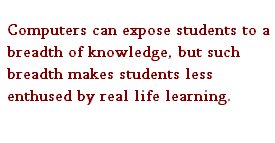However, Monke goes beyond mere success in the workplace. He goes on to relate that computers can hamper children’s capability to appreciate “what it means to be alive, what it means to belong in the world as a biological, social being.”
 These are powerful accusations, and they must be duly considered. Computers can expose students to a breadth of knowledge, but such breadth makes students less enthused by real life learning. Going to a local museum or a local historical site can be very dull when compared to a virtual tour of the Coliseum. At a museum, students need to engage their minds, read signs and imagine how things once were in bygone days. Students also need to understand these things in context—social, geographic, cultural, etc.. Local history, although less glamorous, allows students to see the far-reaching ramifications of historical human interaction in their own community. Technology cannot offer students this context, nor can it challenge students to patiently engage their minds and make connections. If a web site is boring or not uploading fast enough, students can click away. This promotes lazy and impatient “learning”—with very little depth or contextual meaning.
These are powerful accusations, and they must be duly considered. Computers can expose students to a breadth of knowledge, but such breadth makes students less enthused by real life learning. Going to a local museum or a local historical site can be very dull when compared to a virtual tour of the Coliseum. At a museum, students need to engage their minds, read signs and imagine how things once were in bygone days. Students also need to understand these things in context—social, geographic, cultural, etc.. Local history, although less glamorous, allows students to see the far-reaching ramifications of historical human interaction in their own community. Technology cannot offer students this context, nor can it challenge students to patiently engage their minds and make connections. If a web site is boring or not uploading fast enough, students can click away. This promotes lazy and impatient “learning”—with very little depth or contextual meaning.At my school, each year we spend thousands and thousands of dollars on updating computer labs, lap tops, software, on-line service subscriptions, etc. I think we need to think more carefully about technology in the classroom and in education for that matter. Computers do not necessarily “equal” better. Exposing students to more information does not mean the students are thinking critically, researching effectively, synthesizing or even understanding what they are exposed to.
To paraphrase McLuhan, technology has indeed become a “message” unto itself. Case in point is student use of Power Point. Somehow students believe that they have put together a fabulous presentation if they slap their notes up on the screen. Content becomes secondary.
Not all that glitters is gold. Students need to realize that just because something looks “good”—flashy Power Point presentation, colourful image-laden website, neat-looking Word Processed essay—doesn’t mean that it IS good. As Monke points out in his article, students take for granted all the work and expertise that went into the creation of computer software. All the spell checking, grammar checks, built in thesaurus… Students need to learn how to work for themselves. There are too many “auto-pilot” modes when it comes to technology. Too much dependence on technology will result in schools preparing the road for the child, instead of preparing the child for the road.
Link to the Lowell Monke article originally published in the Toronto Star (of all places…)





No comments:
Post a Comment